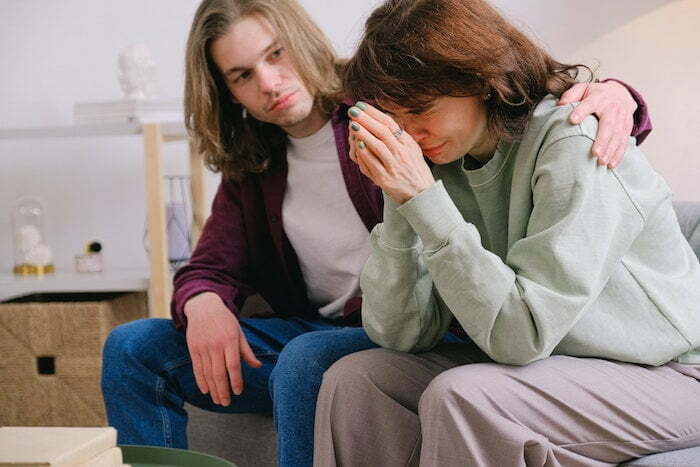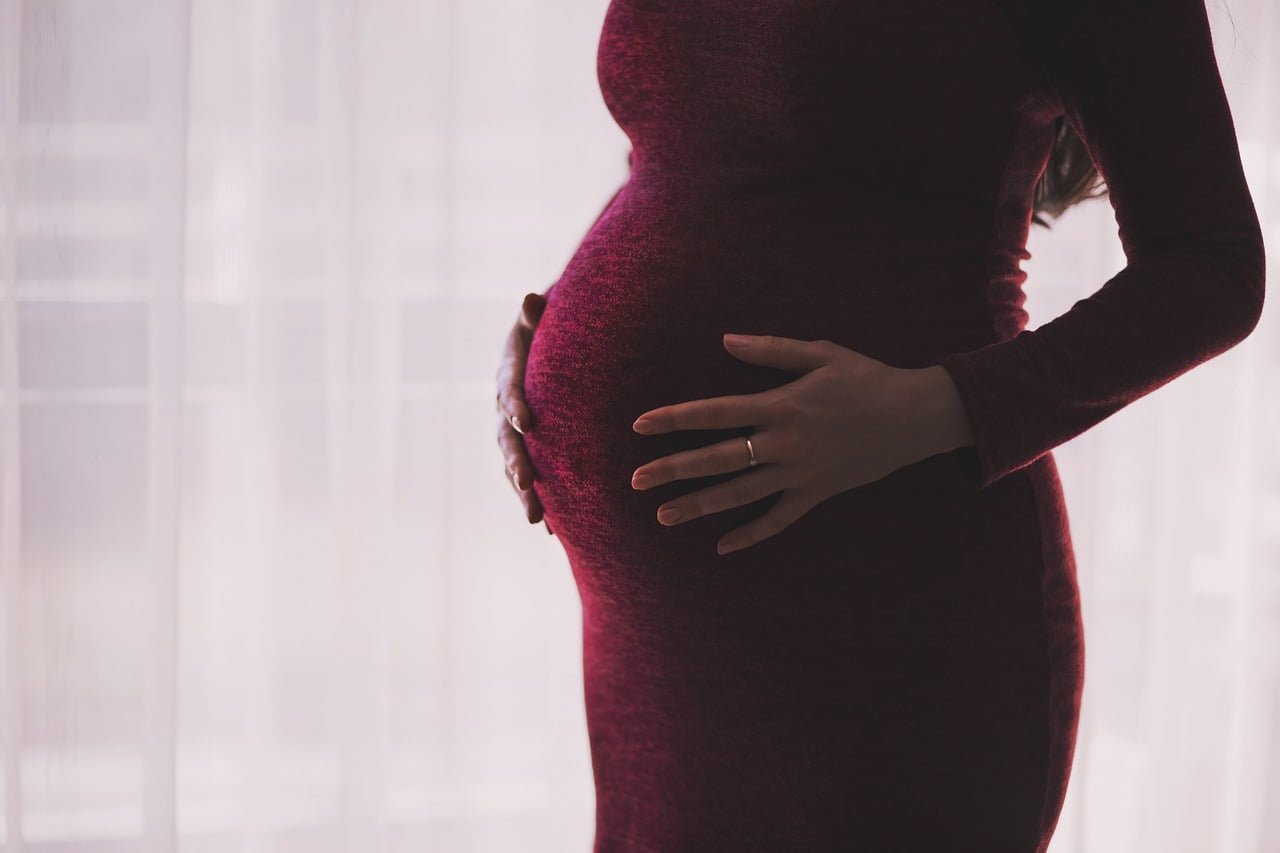Quick links for alcohol and postpartum depression
- What does postpartum depression involve?
- What are the symptoms of postpartum depression?
- What causes postpartum depression?
- The link between postpartum depression and alcoholism
- Who is most at risk of postpartum depression?
- What are the risks of postpartum depression?
- Treatment for postpartum depression and alcoholism
- When to seek help for postpartum depression and alcoholism
- How to get more information on postpartum depression and alcoholism
- References for alcoholism and postpartum depression
Motherhood can be incredibly stressful, and feelings of sadness or anger are very common after having a baby.
While these emotions usually fade after a few days, this does not happen for everyone.
For some mothers, these emotions – as well as a few negative physical effects – persist, developing into a major depressive disorder like postpartum depression. [1]
It can be a difficult thing to cope with, putting mothers through physical discomfort and compromising their ability to parent.
In some circumstances, the pressures placed on a mother by these symptoms can push them towards alcoholism, making them feel like drinking is the only way to ease their pain or distress.
When this occurs it can be very dangerous, placing both the mother and their child at risk of alcohol’s most destructive effects.
What does postpartum depression involve?

Woman sat next to a lake holding her legs and thinking about postpartum depression
Following the birth of a child, it is common for a new mother to experience a range of negative physical and mental effects. These tend to pass in time, but major depression types are known to develop.
One of these types is postpartum depression, a condition that is quite common in new mothers. [2]
It involves intense fluctuations in hormonal activity, triggering sudden changes in mood and unsettled body chemistry.
These effects not only influence a mother’s mental well-being but also compromise their ability to look after themselves and their baby.
Symptoms can become a barrier to behaving how they would like, sometimes disrupting the emotional connection between them and their child.
Although it is thought that postpartum depression is a short-lived disorder, it can sometimes last for several months.
What are the symptoms of postpartum depression?

New mother sat behind a sofa struggling with postpartum depression
When a woman goes through postpartum depression, they are impacted on both a physical and psychological level.
Not only do their hormones weaken their ability to physically care for their child, but they impact their mood and worldview as well.
Common symptoms of postpartum depression [3] include:
- Numbness or feelings of indifference to the child
- Increased anxiety and worrying
- Tiredness, fatigue, exhaustion, or restlessness
- Feelings of hopelessness, intense sadness, or depression
- Appetite changes
- Doubting parenting ability
- Frequent crying
- Feeling absent
- Insomnia
- Feeling disconnected from the child
- Panic attacks
- Losing contact with or avoiding friends and family
- Body discomfort, including aches and pains
What causes postpartum depression?

Man comforting a woman struggling with postpartum depression
Women are more likely to develop the condition if they already have depressive tendencies.
The stresses of motherhood – lack of sleep, relationship strain, lack of nutrition, hormonal changes – apply pressure to them which they are unable to handle.
This triggers the underlying depressive tendencies within them, manifesting as postpartum depression.
The condition is also more prevalent in those who are not ready or were not expecting to become parents, as the new stresses come as more of a shock. [4]
This includes younger and more reluctant mothers.
The link between postpartum depression and alcoholism

Woman in a darkened room looking down and thinking about postpartum depression
The symptoms of postpartum depression can be incredibly distressing, leaving a mother worried for both herself and her child.
They may worry about the effect their symptoms will have on their body, their relationships, or their baby’s development.
As a result, it is common for those who suffer from the condition to turn to alcohol as a means of self-medication. The sedative effects of alcohol can numb some of the negative symptoms, providing short-term relief.
This may involve easing some physical pain, calming worrying thoughts, or taking their mind away from worries about their relationship with their baby.
However, this behaviour can lead to dependence.
Alcohol is known to have a significant impact on body chemistry, and excessive consumption can force the body to rely on the substance’s presence within its system to work.
This forces mothers to keep drinking, both to sustain their control of postpartum symptoms and to avoid distressing withdrawal symptoms. They become trapped in the addictive cycle, unable to break it by themselves.
Who is most at risk of postpartum depression?

Woman discussing postpartum depression with a therapist
Not all mothers who struggle with postpartum depression become dependent on alcohol.
There are certain individuals who are more at risk of developing postpartum depression [5] and these include:
- Mothers lacking sufficient support with parenting, such as from a partner or wider family members
- Mothers suffering from insomnia and other lifestyle stressors
- Mothers with a history of substance abuse preceding their pregnancy
- Mothers from lower-income backgrounds
- Young or first-time mothers
What are the risks of postpartum depression and alcoholism?

Woman struggling with postpartum depression
Alcoholism is a dangerous condition, able to impact both the individual it involves and the people around them.
When a mother and dependent child are involved, this threat is even bigger.
Firstly, the abuse of alcohol can cause damage to the physical health of the mother.
Alcohol is a destructive substance, potentially weakening the immune system, damaging internal organs, or increasing the chance of injury with excessive use.
Postpartum depression and alcoholism during breastfeeding
In the case of motherhood, the effects of alcoholism can also reach the child through breastfeeding.
The alcohol in the mother’s system can pass onto them, exposing them to its hazardous effects.
This can lead to complications in behaviour and development, depression in later years, and an increased risk of alcohol dependency when they become an adult themselves.
As a result, it is recommended that mothers who are struggling with substance abuse do not attempt to breastfeed their babies until two hours have passed since their most recent drink, or alternatively to use a bottle.
Postpartum depression and alcoholism and their impact on the other parent
Finally, it is also important to note the effect alcoholism and postpartum depression may have on the other parent(s) of the child.
Not only will it be distressing to watch their partner suffer, but the father may also need to take on more work if the depression and alcoholism cause the mother to abandon her responsibilities.
This may cause them to resent the mother or child, or spark feelings of depression in them as well.
Treatment for postpartum depression and alcoholism

Therapist taking notes whilst speaking with a patient about postpartum depression
Treating postpartum depression and alcoholism can be a difficult process.
As the conditions are interconnected with one another, they must be treated simultaneously, which can result in a long and complicated road to recovery.
There is no single way to treat those who show signs of both disorders – each case is unique and will require a different medical approach
In spite of this, there are common methods of treatment that may be utilised.
These include:
- Medically assisted alcohol detox, involving the prescription of medicinal substitutes to reduce withdrawal symptoms
- Antidepressants
- Therapy, either an individual or as part of a group, to discuss thoughts and feelings
- Family or relationship counselling
- Cognitive Behavioural Therapy (CBT), designed to help develop healthier ways of responding to difficult situations
- Psychoeducation, designed to help teach individuals about their conditions
While the methods may vary, the goal of treatment is always to help an individual kick their dependence on alcohol and manage their depression symptoms better.
The choice of treatment methods will depend on the circumstances of an individual’s specific situation, taking into consideration what symptoms are proving most difficult to deal with and what underlying causes are sustaining their alcoholism.
Symptoms of either condition may persist after treatment, but the hope is that the individual will be in a much better position to handle them, while also being able to parent their child more effectively.
When to seek help for postpartum depression and alcoholism

Pregnant woman thinking about postpartum depression
As with other conditions, it can be difficult to know when substance use during postpartum depression has become unhealthy.
It is especially difficult to analyse one’s own behaviour.
It is important to seek help if alcohol causes or encourages you to do any of the following things:
- Blackout or have memory loss
- Neglect or forget about your child
- Abandon or stop caring about errands
- Hurt or want to hurt yourself or your child
How to get more information on postpartum depression and alcoholism

Woman typing on a phone to seek help for postpartum depression
Alcoholism can be a very frightening condition to deal with, especially when a child’s life is involved.
Therefore, it is important to seek help and get advice when postpartum depression and alcoholism become a problem.
To discuss the details of your situation and get information as to what local treatment methods are available, speak to your GP or call our expert team today.
References for alcoholism and postpartum depression
- https://www.nhs.uk/mental-health/conditions/post-natal-depression/overview/
- https://www.womenshealth.gov/mental-health/mental-health-conditions/postpartum-depression
- https://www.nhs.uk/mental-health/conditions/post-natal-depression/symptoms/
- https://medlineplus.gov/ency/article/007215.htm
- https://www.ncbi.nlm.nih.gov/pmc/articles/PMC3742364/






